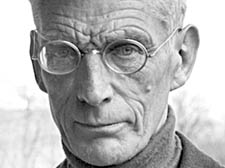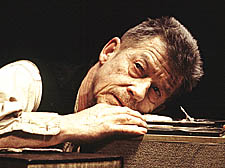|
|
 |
| |

Samuel Beckett

John
Hurt in Krapp’s Last Tape showing as part of the
Barbican’s celebration of Beckett’s centenary
from April 25 to May 6 |
Samuel Beckett gave the world everything
he had
It's Beckett's centenary. His
friend John Calder recalls a kind man who couldn't come to terms
with the cruelty of the world
SAMUEL Beckett was born in a significant year, that of the great
Liberal Party landslide which signalled Irish Home rule, which
his Dublin middle-class protestant family almost certainly were
against.
Unfortunately the Great War delayed it at great cost in suffering.
But the studious sport-loving boy who grew up there always had
his sympathies with the underdog and he was to leave Ireland
as soon as his studies were finished to become a typical Parisian
Bohemian.
This year, his centenary is being celebrated everywhere, and
everyone who ever met him is exaggerating their acquaintance
and producing anecdotes, true or false, first or second-hand,
about a man who was simple, straightforward and hated attracting
attention.
He was a genius certainly, very like Shakespeare whose work
his much resembles, and very erudite, but he wore his knowledge
invisibly. No man was easier to talk to and he had no sense
of being in any way superior.
I knew him for 35 years more as a friend than as my author and
in consequence he never tried to hide his feelings where we
disagreed or where I was late for an appointment or neglectful,
whereas with most others he put on a mask, either for protection
or out of politeness.
My discoveries in his work about sources were not particularly
welcome because they usually revealed some long-buried secret,
such as sexual humiliation or the use of a religious reference
that he knew would bring attack if made public. Although he
is thought of as being difficult to understand, I profoundly
disagree. What is difficult in a world that values celebrity,
short-term success and pleasures, and the need to always be
optimistic about life, is to accept his view of human life and
the world it lives in. To be born into the world was the worst
thing that can happen to anyone, as Beckett saw it.
Life is tragic because it is short, usually full of pain and
suffering, and ruled by a malign morality where everything eats
everything else, or enjoys being cruel or is simply indifferent
about the plight of everything out of immediate sight.
Religion – and Beckett grew up in a religious protestant
family – tries to hide all this and make us think of a
heaven to come, but Beckett could not swallow that. He did,
however, use the mythology of Christianity, which he knew well,
to give a picture of the world which is sometimes very funny
as he describes our follies and obsessions, often shocking to
the conventional mind as he follows the logic or some religious
dogmas to their impossible conclusions, and very thought-provoking
to anyone philosophically inclined.
Many years ago I used to say that if Beckett had set himself
up as the creator of some new faith that he would have had many
converts. Now I realise that much of his work can be seen as
secular theology. He examined religion – all religions
– and saw them as improbable, but knew they were believed
in because people wanted to believe in them.
It was not love or God that moved people to religious observance,
but the desire to remain conscious and continue existing in
an afterlife. Beckett was very interested from his days in Trinity
College in the many theories of dualism, that of the division
between mind and body as two different entities for one, but
even more in the continual battle between good and evil.
This was much discussed in the early days of Christianity, but
the church disapproved, particularly in the theory that God
was so far away making more universes that he had forgotten
all about us and put a deputy, often called the Demiurge, in
charge. This deputy was sometimes identified with the Devil
and as it is obvious to anyone that more bad things are going
on than good, it was clear that the devil ruled.
Many religions other than early Christianity have seen the world
as a conflict of the two opposing forces and have formed ultra-puritan
sects to let the good have a chance against the power of evil,
and these have been ruthlessly put down, like the Cathars of
France.
Much of Beckett’s work comes out of his fascination with
this conflict, which can also be seen as a conflict going on
inside nature, including human nature. Krapp’s Last Tape,
his most autobiographical play, is about this exactly.
So to return to a look at the man himself, Beckett was a Christian
who lost his faith, always missed it emotionally, and used it
as the underpinning of his vision of the world. As he knew that
he could do little to change the world, he helped those he could
with money when he had it, but with everything else he had,
risking his life during World War II, although Ireland was neutral,
by joining the French Resistance, largely out of loyalty to
his friends.
As life is a bad accident all you can do is describe it as such
if you are a writer, and in practical terms try to do no harm
to anyone, always show kindness, and be willing to help those
worse off then yourself.
His kindness was legendary, in small as well as in large things.
He died in 1989 at Christmas, having been born on a Good Friday,
not only symbolically reversing the Christian dates for birth
and death, but illustrating his famous dictum: “One is
born astride of a grave.”
It is a pity that the competition to have some kind of exclusive
hold on Beckett’s work and personality has given rise to
rivalries and even hostilities between theatre companies, academics
exploring his writings and even those who knew him. He gave
the world everything he had.
His legacy lies in the world, not God’s, which we could
make better if we wanted to, but don’t because of tribalism,
selfishness, short-sighted self interest and stupidity. If you
take his work at its real worth and can accept his ethic you
will be a better person and improve the world a little. He was
wise enough and realistic enough to know that no one can do
more than that.
|
|
 |
|


